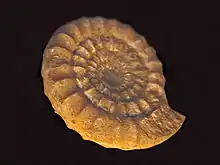Echioceratidae
Echioceratidae is an extinct family of ammonites that lived during Sinemurian stage of Early Jurassic.[1]
| Echioceratidae | |
|---|---|
 | |
| Fossil shells of Echioceras raricostatum from Pierreclos (France), on display at Galerie de paléontologie et d'anatomie comparée in Paris | |
| Scientific classification | |
| Kingdom: | Animalia |
| Phylum: | Mollusca |
| Class: | Cephalopoda |
| Subclass: | †Ammonoidea |
| Order: | †Ammonitida |
| Suborder: | †Ammonitina |
| Superfamily: | †Psiloceratoidea |
| Family: | †Echioceratidae Buckman, 1913 |
Description
Ammonites belonging to this family had serpenticone shells with keel, that can be surrounded by grooves, if a species is densely ribbed and compressed. Whorl section is circular, or has flat sides. Ribs are simple and strong with the exception of Leptechioceras that had strongly compressed whorl section on outer whorls and these outer whorls were also smooth. Initial ontogenical stage is smooth, but very short. Tubercules were present, but only in few species.[1]
Genera and subgenera
Following genera are members of this family:[1]
- Palaeoechioceras Spath, 1929
- Gagaticeras Buckman, 1913
- Plesechioceras Trueman and Williams, 1925
- Orthechioceras Trueman and Williams, 1925
- Echioceras Bayle, 1878
- Paltechioceras Buckman, 1924
- Leptechioceras Buckman, 1923
- L. (Leptechioceras)
- L. (Neomicroceras) Donovan, 1966
Distribution
Fossils of species within this genus have been found in the Jurassic rocks of north Africa, South and North America, Europe and Asia.[2][1]
References
- M. K. Howarth 2013. Treatise on Invertebrate Paleontology, Part L, Revised, Volume 3B, Chapter 4: Psiloceratoidea, Eoderoceratoidea, Hildoceratoidea.
- The Paleobiology Database